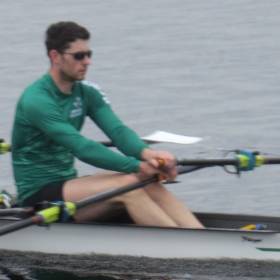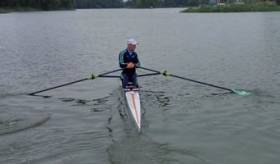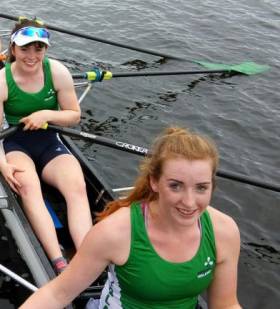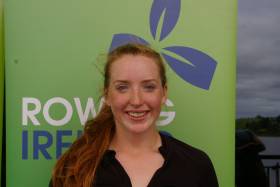Displaying items by tag: European Under23 Championships
Byrne Adds Under-23 Gold to World Championship Silver Medal
#Rowing: Ronan Byrne won gold for Ireland at the European Under-23 Championships in Ioannina, Greece, this morning. He beat Russia’s Alexander Vyazovkin by four seconds in the single sculls final.
The Ireland women’s coxed four took fifth in their straight final, while Hugh Moore was fourth in his B Final of the lightweight single, 10th overall, and the double of Alex Byrne and Ross Corrigan took second in their C Final, 14th overall.
European Under-23 Championships, Ioannina, Greece, Day One (Selected Results; Irish interest)
Men
Double Sculls – C Final: 2 A Byrne, R Corrigan 6:43.69.
Single Sculls - A Final: 1 R Byrne 6:48.28.
Lightweight Single – B Final: 4 H Moore 7:30.07.
Women
Four, coxed - Final: 5 Ireland (C O’Brien, K Shirlow, L Murphy, N Casey; cox: A Humphries-Griffiths) 7:20.37.
Ireland's Goff Secures Place in A Final of European Under-23 Champs
#Rowing: Ireland’s Andrew Goff has qualified for the A Final at the European Under-23 Rowing Championships. In beautiful calm conditions with a slight headwind in Kruszwica in Poland, the UCD man took a good second place behind Jan Cibuch of the Czech Republic. Goff started well and once Cibuch took over in the lead Goff stayed comfortably in touch. Sweden’s Filip Nilsson finished third.
European Under-23 Championships, Kruszwica, Poland, Day Two (Irish interest)
Men
Lightweight Single Sculls – A/B Semi-Final Two (First Three to A Final; rest to B Final): 1 Czech Republic 7:34.58, 2 Ireland (A Goff) 7:37.64, 3 Sweden 7:42.26.
Semi One: 1 Austria 7:32.69, 2 Turkey 7:34.45, 3 Slovenia 7:40.16
Ireland's Eight Fifth on First Outing at European Under-23 Championships
#Rowing: Ireland’s women’s eight finished fifth in the race for lanes at the European Under-23 Rowing Championships in Kruszwica in Poland today. The crew of Emily Hegarty (Skibbereen RC), Sadhbh O’Connor (NUIG BC), Oisin Forde (Cork BC), Aoife Corcoran (DULBC), Caoimhe Dempsey (DULBC), Claire Feerick (Neptune RC), Nuala Landers (NUIG BC), Ruth Gilligan (UCD BC), and cox Cormac O’Connell (UCC) will compete in the final tomorrow (Sunday).
Romania won this race, with three other countries quite close behind: Russia, Britain and Belarus. Over 20 seconds further back, Ireland finished ahead of Germany, who were sixth.
European Under-23 Rowing Championships, Kruszwica, Poland (Irish interest) – Day One
Men
Lightweight Single Sculls – Heat Two (First Three to A/B Semi-Final; rest to Repechage): 3 Ireland (A Goff) 8:21.00.
Women
Eight – Race for Lanes: 5 Ireland 7:21.92.
Goff Fights Through Headwind to Qualify for European Under-23 Semi-Final
#Rowing: Ireland’s Adrew Goff has qualified for the A/B semi-finals at the European Under-23 Rowing Championships. The UCD man finished third in his heat this morning in Kruszwica in Poland. Goff started well but, in difficult, headwind, conditions, he yielded the lead to Jan Cincibuch of the Czech Republic, who won well. Goff and Enes Yenipazarli of Turkey, who finished second, then firmly established themselves in the next two qualification places. This was by far the fastest of the heats, with all three qualifiers inside the winning time in heats one and three.
The weather has been extraordinary at the venue: the opening ceremony had to be cancelled because of torrential rain and the temperatures dropped from 30 degrees on Thursday to half that on Friday.
European Under-23 Rowing Championships, Kruszwica, Poland (Irish interest) – Day One
Men
Lightweight Single Sculls – Heat Two (First Three to A/B Semi-Final; rest to Repechage): 3 Ireland (A Goff) 8:21.00.
Two Ireland Crews Compete at European Under-23 Rowing
#Rowing: Ireland will compete at the European Rowing Under-23 Championships this weekend. A team of athletes, along with coaches and management, departed for Kruszwica, Poland, earlier this week for the event which takes place on Saturday and Sunday, the 2nd and 3rd of September.
The Ireland women’s eight will be the first crew of this category to compete for the country at a FISA World Rowing event.
UCD’s Andrew Goff, who was part of the Ireland lightweight quadruple which took bronze at the World Rowing Under-23 Championships last month, will compete in the lightweight men’s single sculls. Goff was due to team up in a lightweight men’s double sculls with Niall Beggan, who has been forced to withdraw from racing due to illness.
The women’s eight crew will be made up from seven clubs from Cork, Galway and Dublin. The athletes selected are Emily Hegarty (Skibbereen RC), Sadhbh O’Connor (NUIG BC), Oisin Forde (Cork BC), Aoife Corcoran (DULBC), Caoimhe Dempsey (DULBC), Claire Feerick (Neptune RC), Nuala Landers (NUIG BC), Ruth Gilligan (UCD BC). UCC’s Cormac O’Connell will cox the crew. Coaches John Armstrong and Paul Thornton have travelled to Poland. Denis O’Regan is the team manager.
Kruszwica is a town in central Poland, situated at Lake Goplo. The Kruszwica regatta course is a natural rowing course.
The event includes over 150 entries. Heats and repechages take place on Saturday, followed by semi-finals and finals on Sunday. The draw will be made tomorrow (Friday) afternoon.

































































